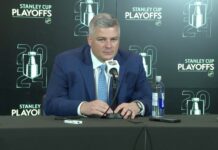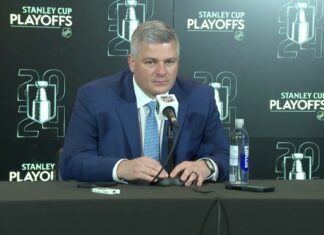Jacques Lemaire joined Prime Time Sports to discuss his new role with the Toronto Maple Leafs, and working alongside Mike Babcock, Lou Lamoriello, and Sheldon Keefe.
Bob McCown: Tell me a little bit about this decision. When Lou took the job as GM of the club, I assume he reached out to you fairly quickly here. Did he even reach out to you before he took the job with the Maple Leafs?
Jacques Lemaire: No. What happened, when he got hired, the day after Mike Babcock called me. That same day, Lou called me back after. They probably talked together and then they got a hold of me, asking me if I was interested in joining the team.
McCown: The term special assignment coach you understand puzzles some people. It’s not a term that we understand totally because it can mean a variety of things. How have they explained the job definition to you?
Lemaire: First of all, Mike is the head coach and will make all decisions about how the team plays and who is going to go on the ice, who is going to play on the powerplay. My role is, first of all, I will be watching all the games and giving him my input on the players on everything that goes on, just so that he gets more information. I worked like that in the past with people and it works well. It just gives you another idea, another different opinion on people, and, like I said, all the decisions will come from Mike.
Elliotte Friedman: How much did you watch Toronto last year?
Lemaire: I have to admit that I didn’t watch many games, except when they were playing against a team that [was] either Jersey or Tampa at different times.
Friedman: When you did watch, what did you see?
Lemaire: It would be really hard to make any comments on the individual right now. I didn’t see them enough, but it won’t be long that I will be able to.
McCown: Would you expect that all, or the majority of the time, you’ll be watching from the stands, or the pressbox… or the cottage?
Lemaire: I expect — I already talked to Mike about this – I will probably spend a couple of weeks at the training camp just to get to know the players and see how they start and all that. During the season, I will come up at different times when Mike feels that there would be a need. I will be working with the Marlies, too. I think that — working with the Marlies with Sheldon Keefe — it will be fun too. All the kids are there and they’re the ones that in a year or two will be up with the big club. All of that is very interesting to me.
McCown: Would you expect to spend any time on the ice over the course of the next year?
Lemaire: I had that same type of job with New Jersey and I did when I went to Albany, but the thing you have to do is respect the coach. A lot of times coaches they want to do their own thing and want to be on the ice and they have enough people. An extra guy is not welcome sometimes. I know that, when I went to Albany, the coach asked me to go on himself. He said, “well, we have an optional today, and the guys I think they would appreciate if you come on.” So I put the skates on, I went on. I really want to let the coach do his thing and then be able to talk to him and go over a lot of stuff with him after practice; things like that.
Friedman: You’ve worked with Mike Babcock before at the 2010 Olympics in Vancouver. You’ve obviously worked with Lou Lamoriello several times. They are both alpha males; they like being the boss, they are used to being in charge. How do you think they’ll work together?
Lemaire: I think it’s a great fit. It’s a great fit because, both of them, they love hockey; they have that passion for the game. That’s all they talk about. It’s hockey 10 hours a day. Until they have found exactly what they’re looking for, they’re going to search and search – doesn’t matter what time it is. Lou is like that and Mike is like that. I think it will be a great fit.
Friedman: Were you surprised? What was your reaction when Lou Lamoriello was coming here?
Lemaire: I was surprised in a way, because I didn’t think that Lou would take another job. He was in Jersey for so many years. I was surprised at the start, but thinking about it, I was not. Lou is a man who needs to do something with the game. He needs to be involved in the game. He’s been like that for years. He loves it. At that moment, when I saw that it looked like he wasn’t involved too much with the hockey people there, then I wasn’t surprised at all.
McCown: I hate to keep going back to the title – the special assignments coach – but because of your relationship with Lou it is clear the primary job definition you have here is with Mike Babcock on the coaching side; the nurturing of players, the development of players, etc. How do you see your relationship with Lou going forward? I would assume, because you two have a long history and are friends, you’ll spend considerable time with him. Will any of your role translate into his arena?
Lemaire: Probably some. I think it will be [like] the way we were working in New Jersey. At times Lou called me and said that I’d like you to go come down. I flew to Jersey and then I spent two-three practices and then saw a couple games, and then went to Albany and came back. He asked me, when he felt he needed me around, he called me and I flew up there. I think, with Toronto, it will be similar with them and it will be the same thing with Mike. If Mike needs me, says, “I need you Jacques, I’d like you to come; we’ve got certain games that are important for us,” and so on, then I’m going to fly up to Toronto. But a lot of games, as I did in the past, all the games I watched them, I taped them, I looked at different stuff. I make my report to the coach; the coach calls me on different stuff that he wants me to watch. It’s very interesting.
Friedman: There have been several times that you have said, “I’m never going behind a bench again,” only for Lou Lamoriello to find a way to pull you out of retirement. Can we definitely say, and we know Mike Babcock is here for a long time, but as an assistant or anything else, no more?
Lemaire: No. I left coaching in 2011-12, and I realized at that time that travelling was getting to me. It was tough for me to travel and get in at three o’clock in the morning and get back on at seven o’clock the next morning. I was getting really tired of that traveling; not the coaching, I loved it. If I could coach again without traveling, I think I would. That’s how much I love it. As a coach, every day you have problems that you have to solve. I just love that; finding a way to help a kid, tell him certain things that will help his game, and after you do it you get that smile from the kid. It’s all about that: Make them better, and then see that they appreciate it. It’s fun.

































